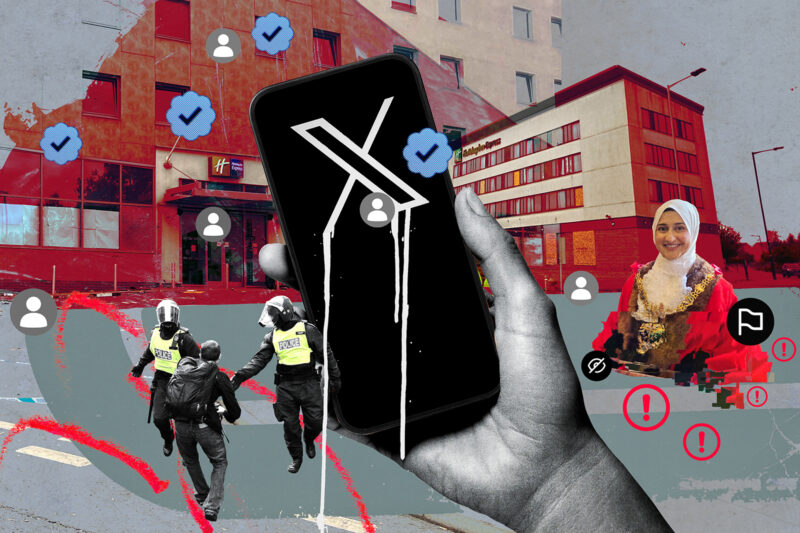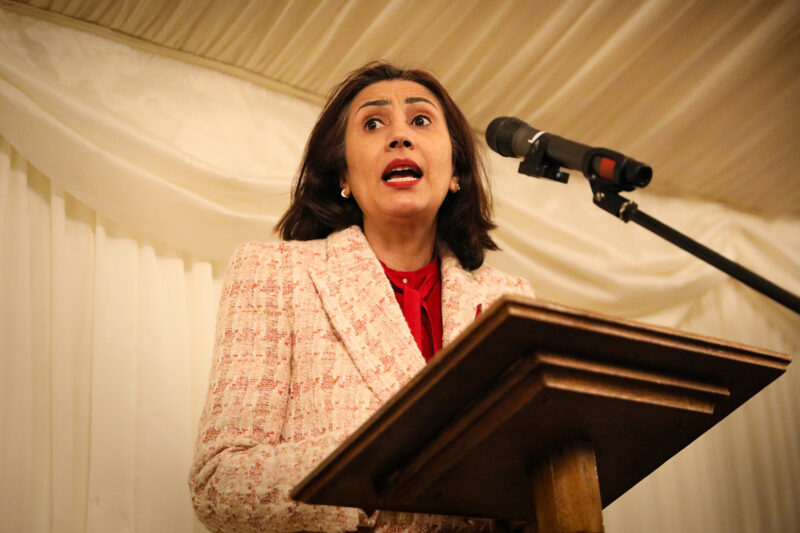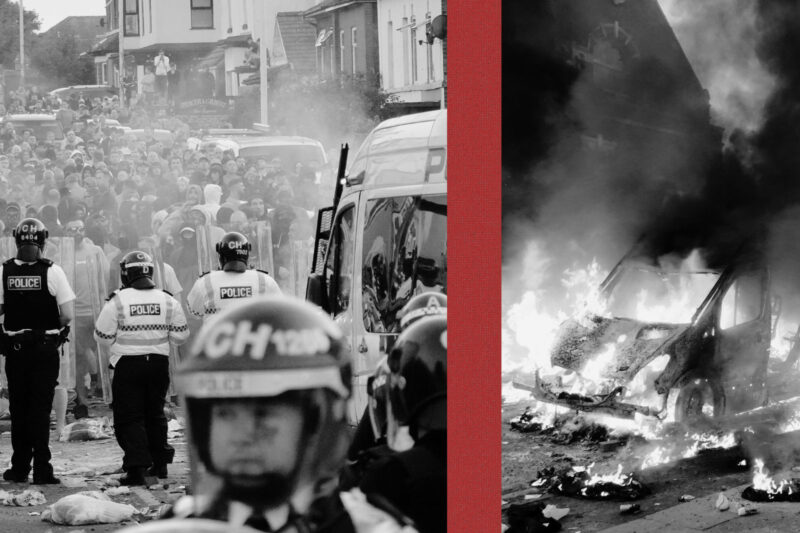The rise of Spain’s far-right YouTubers — and the people taking them on
‘Fachatubers’ like David Santos are whipping up anti-Muslim hate using misleading information. It’s a gift to Vox and other far-right political parties

Police in the Spanish neighbourhood of Raval have warned elderly residents not to go out after 7pm in case they get attacked by migrants. Barcelona’s 9,761 Moroccan men were arrested 10,276 times between them in 2023. These are just two of the alarming claims made by David Santos to his 160,000 YouTube subscribers. They are also both completely false.
Santos is one of about 40 high-powered “Fachatubers” — a portmanteau of “facha” (fascist) and YouTuber — identified by the sociologist and broadcaster Iago Moreno, who studies the rise of far-right social media influencers. These Fachatubers spread anti-immigrant, racist and Islamophobic content to their significant numbers of followers (all have in excess of 100,000), often painting Muslim immigrants as dangerous criminals.
“I believe these YouTubers are responsible for a large part of the success of the far right in Spain,” said Guillermo Fernández Vázquez, a political scientist with the Complutense University of Madrid who studies the extreme right in Europe.
He pointed to the rise of Vox, the explicitly anti-Muslim party that became the third largest in Spain’s parliament five years ago and made significant gains in the 2023 local elections. “If Vox wants to introduce anti-immigration or anti-Muslim ideas on to the political agenda,” he said, “then these types of YouTubers help them spotlight these issues.”
Right-wing social media influencers have begun to wield enormous clout in global politics, giving populist candidates a direct line to, typically, disaffected young men. Standing beside Donald Trump in the hours after his decisive victory against Kamala Harris in the 2024 US presidential election, Trump backer Dana White thanked a string of podcasters for their contribution to the result.
A sign that Spain’s own political establishment is taking Fachatubers seriously was the launch in October 2024 of Conspiranoicos (“conspiracy theorists”) — a TV programme broadcast weekly on one of the country’s largest privately owned channels, La Sexta. The show sees journalists and experts attempt to debunk the claims of YouTubers such as Santos.
Its host, Joaquín Castellón, believes that Fachatubers are key to a far-right media ecosystem that also includes news websites such as La Gaceta, owned by Vox via the private foundation Disenso (“dissent”). Far-right YouTubers, he said, use stories from these outlets as source material, and their videos are then in turn amplified by leaders of Vox on social media.
“They have two objectives,” he said of the content creators. “One is to make money, because you make a lot of money spreading lies, and the second one is political interests.” He credits YouTubers in part for the success of the right-wing party Se Acabó La Fiesta (“the party is over”), which gained 800,000 votes and three seats in the 2024 European elections just months after being founded by the influencer (and now MEP) Alvise Pérez.

But there are more direct relationships between the Fachatubers and party politics, too. Vox representatives regularly appear on Santos’s channel and others like it, and he interviewed Gonzalo de Oro — one of Barcelona’s two Vox councillors — in October about crime and the supposed “Islamisation” of the city.
That discussion, conducted as the pair walked through one of its most diverse neighbourhoods, saw Santos make a number of misleading remarks, including the claim that elderly people had been told not to go out at night, while de Oro nodded in approval. A spokesperson for the local police force told Hyphen Santos’s claim was false, and that no warning had been made about elderly people going out after dark.
Elsewhere in the video, Santos produced figures to show that Moroccan men were being arrested at a rate that outstripped their actual population in the city — but our analysis found he had relied on comparing city-level population data with crime data from a much larger area, and the local police force again told us it did not recognise the claim.
Santos, 40, did not respond when we approached him about the inaccuracies in his statements. But when answering more general questions, he denied using misinformation to support his arguments.
Spain’s love affair with the far right
Santos was born and raised in Málaga, a city in southern Spain separated from Morocco by 540 kilometres of the Alboran Sea. He made his first YouTube videos in his car, filming and uploading his rants about Spanish society.
That hobby became a full-time pursuit five years ago after an accident left him temporarily unable to work as a gardener, and today he makes a living from YouTube. Most of the cash comes from his followers, including monthly subscription fees and donations, as well as what the platform pays him per view, although he says this is “very little”.
The rise of Fachatubers, and the parallel success of Vox, are just the latest chapter of Spain’s love affair with the far right. Francisco Franco’s 36-year dictatorship ended in 1975, but the country’s main conservative opposition, the People’s Party, has its roots in the ashes of his regime, and a recent survey for Conspiranoicos found that one in four people believed Spain had been better off during Franco’s rule.
Meanwhile, hate crime in Spain appears to be on the rise. The number of crimes and incidents recorded by police as being motivated by hate was up 21% year-on-year in 2023, according to the country’s Interior Ministry. The largest chunk of those were related to racism and xenophobia, which accounted for 856 of 2,268 cases — but the true number is likely to be far higher, believes Gabriel Jairodín Riaza Escudero, the director of Observatorio Andalusí.
Jairodín, whose institution monitors the situation of Muslim citizens and Islamophobia in Spain, said incidents often go unreported owing to a combination of scepticism that reporting will lead to charges, and doubt about what counts as a hate crime.
No link has been proven between Fachatubers and hate crime, but Fernández believes social media is partly responsible for Spanish society’s increasingly polarised views about immigration. A survey in October 2023 by the public research institute CIS found immigration was 11th on Spaniards’ list of concerns, with the economic crisis coming out top. Less than a year later, a September 2024 survey by the same organisation found that immigration had jumped to number one, leapfrogging the economy and unemployment.
Santos denies that his work has a real-world impact on Spain’s 2.4 million Muslims. “Hating is not a crime,” he said. “I just give voice to many people who think like me, but it doesn’t have any impact on how these people [Muslims] are being treated in Spain.”
Someone who knows only too well the power of Santos’s following, however, is Muslim TikTok influencer Río Paraíso — who appeared on his channel in 2020 to discuss whether Islam was inherently sexist.
Paraíso — originally from the Spanish territory of Ceuta on the north African coast — has more than 1.1 million followers on TikTok. She posts everything from lifestyle content to videos debunking myths about Islam. “My account actually really took off after the debate with Santos,” she said. “It kind of marked a before and after.”
At one point in their discussion, Santos told her she was too young to wear a hijab and should take it off; Paraíso was 23 at the time. During another part of the interview, he asked her: “Don’t you want to be able to wear a thong on the beach?”
Paraíso’s following may have grown since appearing on Santos’s channel, but the increased visibility has brought with it regular online threats. “Whenever I travel back to Spain, I have to be accompanied whenever I walk around because I don’t feel safe,” she said.
Moreno, meanwhile, points the finger at social media providers for enabling the Fachatubers he studies. “The most important factor behind their rise is that the platforms don’t want to take responsibility,” he said.
He believes YouTube and other platforms actively promote provocative content because it generates high levels of engagement. As a result, he says, videos that are violent, aggressive, discriminatory and dehumanising become more widespread.
YouTube, which is owned by Google, pushed back when asked about this. “Our hate speech policy clearly prohibits content that promotes violence or hatred against individuals or groups based on certain protected attributes, including religion,” a spokesperson said. “We’ll continue to rigorously enforce these policies using a combination of machine learning and human reviewers.”
In the meantime, though, people like Conspiranoicos host Castellón feel the Fachatubers are getting away with putting others at risk.
“They mobilise a lot of people,” he said. “I’m particularly worried about those who go after vulnerable collectives, including migrants and LGBTI+ groups.”
Could Paraíso’s success, and her appearance on Santos’s channel, point to a more direct way for Muslims to take on the Fachatubers at their own game? Despite YouTube’s strong words about clamping down on hate, she too is sceptical.
“These platforms really don’t work in our favour,” she said. “On YouTube or Instagram, Muslims are in the house of the enemy.”
 Newsletter
Newsletter













